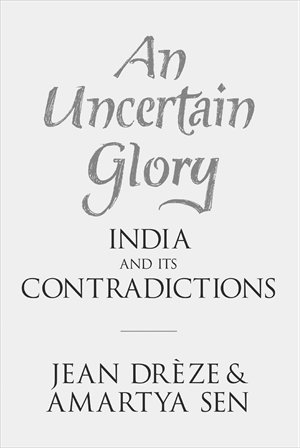HOME >> OP-ED
Hard facts underline cruel realities of India’s persistent social failures
Source:Global Times Published: 2013-9-5 23:53:01

Amartya Sen & Jean Drèze, An Uncertain Glory: India and its Contradictions (Hard Cover), Princeton University Press, August 11, 2013
India is the largest democracy in the world. During the more than a century of British rule, India learned how parliamentary democracy works and built their own system after independence.
They are proud of this political achievement and of the recent economic boom. But while India's social development has made steps forward since 1947, it still lags far behind other developing countries and fellow BRICS members.
How can a country whose economic advances have been so striking, especially of late, have done such a poor job in living standards, public facilities, and education? An Uncertain Glory: India and its Contradictions, written by Belgian economist and activist Jean Drèze and Nobel-prize winning Indian economist Amartya Sen, raises concerns over India's overly unbalanced development model.
A few statistics might help people understand the extent of Indian underdevelopment. No less than 43 percent of Indian children under five are underweight, compared with only 4 percent in China and 2 percent in Brazil. In 2011, 50 percent of Indian households still lacked lavatories, and practiced "open defecation," compared with just 1 percent of Chinese.
According to the Quacquarelli Symonds World University Rankings for 2012, none of the country's universities is in the world's top 200. Half of India's schools had no education activity at all seven years ago. Spending on education is a quarter of the subsidies provided for fuel and fertilizer.
The authors write bitterly that "the history of world development offers few other examples, if any, of an economy growing so fast for so long with such limited results in terms of reducing human deprivations."
Unfortunately, the nationalist right in India has no guts to face its shortcomings. The book has stirred disapproval and censure.
Chandan Mitra, a Bharatiya Janata Party MP and proprietor-editor-in-chief of The Pioneer newspaper, demanded that Sen be stripped of his Bharat Ratna, India's highest civilian reward.
Attempts to rebut the book from the right have been limited to hysterical nationalism and crude attacks.
Drèze and Sen based this book on elaborate statistical analysis. It is incisive, straightforward, and organized in an intelligent and passionate way. They are trying to find out what is holding India back, and are eager to find ways forward for a country they both love.
Development, the authors conclude, is not limited to GDP or greater industrialization. For them "the progress of human freedom and capability to lead the kind of lives that people have reason to value" is what really matters.
This thought-provoking book will show you the other side of India, one too often neglected by the Indian elite themselves.
Posted in: Fresh off the Shelf